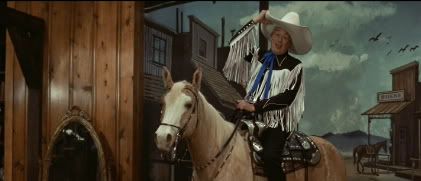(I've decided to repost this in anticipation of tomorrow's new B-Movie Bullsh*t, which shares a very important connection to this particular film. The reason why it's taken me so long to repost it is because doing so represented a major reformating challenge. I think I managed to take care of most of the problems, but I ask your forgiveness for the places I missed or was too frustrated to spend any more time trying to fix.)
Since this is the third time I have taken it upon myself to discuss a WWTTM (a What Were They Thinking Movie, for those of you who are just coming in) I suppose I should take a moment to explain the difference between a film that has earned the above honorific and one that merely sucks ass. It all comes down to two factors, the first of which is that the film itself must be constructed upon an idea, philosophy, casting choice, artistic vision or adaptation that any sane person could instantly tell had no chance of succeeding, and the second is that the resulting movie must be—either despite or because of its inherent flaws—constantly compelling to watch from beginning to end. A WWTTM can be many things—ridiculous, offensive, desperate, cheap, lavish, tacky, dignified, ambitious, lazy or even (in the case of one movie I plan on discussing in the future) genuinely good—but the one thing it CANNOT be is boring.
The subject of today’s discussion can be described by almost all of the adjectives above, with the only exceptions being dignified and genuinely good. It is a film that reaches a level of being one can only attain by accident and not deliberate will—a satire so confused and muddled that it becomes a grotesque self-parody that is easy to laugh at, but impossible to laugh with. It is a filmed adaptation of a novel that is so misguided and distracted by its occasional attempts at plot that one doesn’t have to be familiar with the original book to appreciate how badly the filmmakers failed to do it justice—one has to assume that the book at least made some kind of sense and had an actual point upon which its satire was constructed. It is a film that badly wants to make fun of the period it takes place in, but instead only serves to illustrate the era’s excesses rather than mock them—its desire to be hip being the very thing that renders it square.
Sadly, this marks the high point of Reed's performance.
It is then at this point that we are first exposed to an editing decision made by director Michael Sarne that involves cutting to scenes from classic films to either comment on or serve as ironic counterpart to specific moments in the movie.
Here we cut to a scene from a Shirley Temple movie in which the adorable lil' moppet tells us that she's about to sing a song called "S-M-I-L-E". True to her word, she starts singing the song and we see Myron as he walks down the street in a snazzy white suit. But wait! Didn't Myron get a sex change in the previous scene? Yes he most certainly did, but this seeming inconsistancy is soon shown to be a dramatic device--Myra still sees herself as Myron, so his presence is always with her, even though the rest of the world only sees this:
I'm going out on a limb to say this, but Raquel Welch was hot.
I have no fucking idea.
She also tells us that her "...purpose in coming to Hollywood is to witness the destruction of the American male in all its particulars..." and that the best place to witness said destruction is at the drama school run by Myron's uncle, a former cowboy actor named Buck Loner (John Huston in a performance that makes you truly forget what a great filmmaker he was).
After we are introduced to Irving, one of Buck's longterm students (who tells Myra that most of the school's pupils have been there longer than most of the faculty), we cut to a scene of Myra teaching a class while dressed in a navy officer's uniform (which, of course, comes after a clip of Marlene Dietrich in the same outfit). Buck watches her from a monitor in his office as she tells the class that it is a "...hard fact that American women are eager for men to rape them--and vice versa--and that in every American there is a strangler longing to break a neck during orgasm":
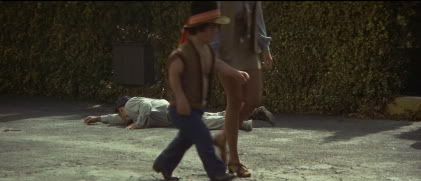
It's just not the right kind of pretentious if you don't get a Little Person in there at some point.
Unsurprisingly, Buck is hesitant to give up half of his property to someone who claims to have married his "fag" nephew, so he decides to investigate Myra's claims and see if they hold up to any scrutiny. Meanwhile, Myra is lecturing about the importance of "star power" to a group of mouthbreathing students at a table in the school's saloon. Among these students are a studly young hillbilly named Rusty Godowski (Roger Herron in his first and only major film role) and his ultra-blond girlfriend Mary Ann Pringle (a 23 year-old Farrah Fawcett) who Myra--quite accurately--calls "retarded".
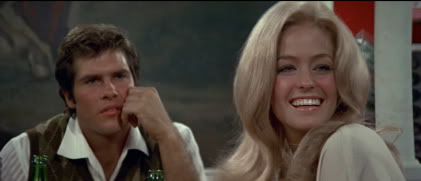
This picture completely fails to convey the complete vacuum that is this couple's onscreen film presence.
It is at this point in the proceedings that the film takes it single biggest leap into the nonsensical and bizarre, as it is here that we are introduced to:
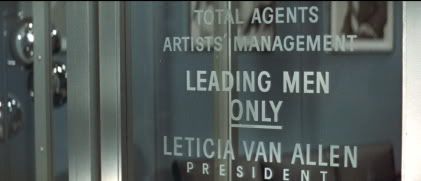
It really is best that you don't think about what's coming next.
Leticia Van Allen is the top agent in Tinseltown, specializing in--as her sign makes explicitly clear--LEADING MEN ONLY. Leticia, as it turns out, is something of a Renaissance Woman, as she is not only a top agent, but also a movie star, recording artist and nightclub singer. But these various pursuits rank far behind the true raison d'etre of her existence, which is to get laid and speak only in an endless stream of embarrasingly unsubtle inneundo. This in itself would not be to bad, were it not for the fact that Ms. Van Allen is portrayed by none other than Mae West herself, who was 77 when the movie was filmed and looks it.
Among the gaggle of handsome men waiting to see Ms. Van Allen is a young Tom Selleck, who is selected by the horny geriatric to sit down on her casting couch:
Selleck's ability to convincingly play a man who isn't revolted by West's creepy overtures
sure doesn't help squash the gay rumors that have dogged him for years.
If you're wondering what West's character has to do with the plot of the move, don't expect the film to supply an answer. Despite West's top billing and generous onscreen time, her character could have been excised completely from the film without it effecting the story in any way. Instead all she manages to do is remind the viewer that Raquel Welch is actually doing a pretty good job with the material she's being given, which inspires the hope that she'll return onscreen as soon as possible.
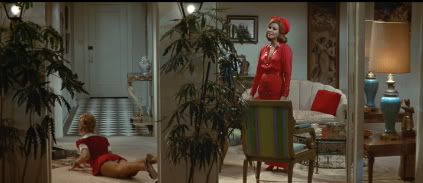
Let's hear it for gratitous panty shots!
Following the unpleasentness of the previous sequence, the movie cuts to the the much more attractive sight of Myra and Mary Anne relaxing at Myra's apartment. After giving a short lecture on the glories of singing stars from the past ("Why the Andrew Sisters really did "Roll out that Barrel" and no one yet has ever rolled it back.") Myra tells the young woman that of all the students at the school she has the most star potential. Mary Anne recieves the compliment graciously, but admits that she only goes to the school to be with Rusty and all she wants from life is to marry him and have four children--a revelation that sickens Myra to her very core.
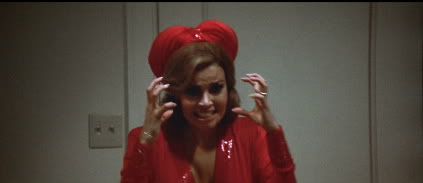
Can you feel her frustration and rage? Or do you expect her to start ranting about wire hangers?
After she has ranted to Myron about Mary Anne's ignorance of popular music from the 40s and her selfish desire to help populate an over-crowded world, Myra once again recites her mission statement, telling us that:"My goal is the destruction of the last vestigal traces of traditional manhood," in order to "realign the sexes," while "decreasing population," thus "increasing human happiness, " and "preparing humanity for its next stage."How exactly she is to do this by working at a low-rent drama school and fucking around with a hillbilly and his retarded blond lollipop of a girlfriend is anybody's guess.But before we can start pondering this too deeply, we are then treated to the most bizarre tribute to masturbation ever lensed in the 7th decade of the 20th century. In a scene that is best not overly contemplated, lest it cause migraines, Myra proceeds to give her male counterpart a blowjob:
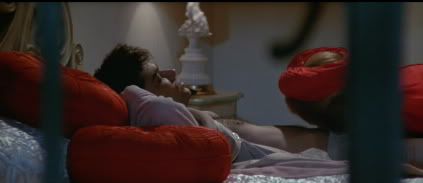 Oh, the horrible waste of it all.
Oh, the horrible waste of it all.They could have at least hired someone who would have enjoyed pretending to be fellated by the lovely Ms. Welch.
While he in turn fantasizes about being fed bananas by a lingerie clad Mary Anne.
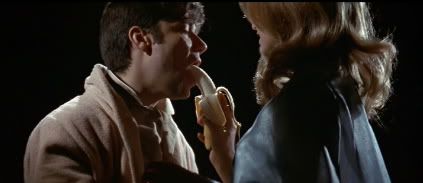
There are no words.
After a few--way too long--shots of Reed pretending to pleasure himself (sans Myra) we cut over to a scene where his female half is giving a lecture on the incredible star presence of Johnny Weismuller in Tarzan and the Amazons, which infuriates one of the faculty members who complains that the film is "trash" and "lacks a single moment of truth in it".
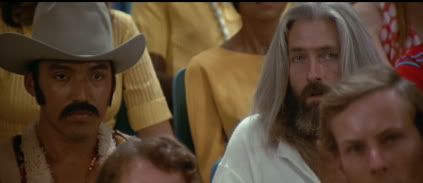 Sarne thinks it is amusing to cut to a shot of himself (he's got the beard)
Sarne thinks it is amusing to cut to a shot of himself (he's got the beard)just as Myra starts talking about actors who have played Jesus.
That's something an asshole would do.
Thanks to his TV monitors, Uncle Bucks hears Myra speaking and decides to abandon his massage in order to tell her that her crazy ideas are having a negative affect on the students. Myra will have none of it and tells him that his school has "...assembled...the national dregs, the misfits, the neurotics--in short, the fuck ups of our culture." Buck defends his pupils and threatens to fire her, to which she responds by threatening to take away the entire school from him. This gets his back up and he tells her that he isn't certain that she was "...even ever really married to that fag." Myra responds to this suggestion like a true lady.
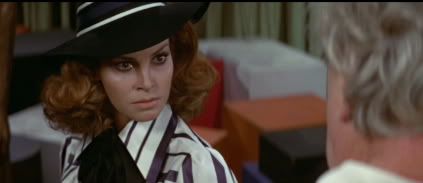
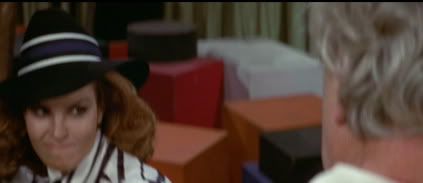
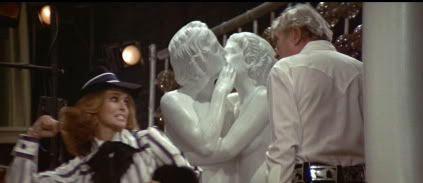
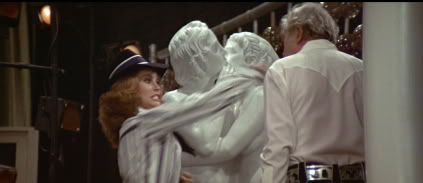
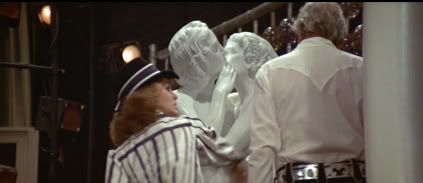
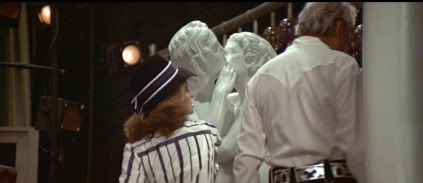
Oh, snap! Oh no, she dinnit!
This brief bit of action (which has to be the most poorly shot punch I've ever seen) is followed by another appearance by The Mummy--I mean Leticia Van Allen.
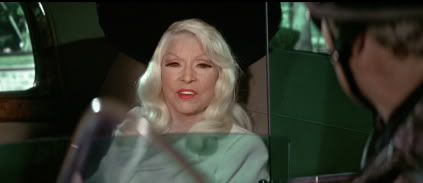
And this is with ten pounds of make up and an industrial strength wig!
Here the next three minutes of the film are dedicated to propping up a poor deluded old woman's ego as some poor Italian actor is forced to play a scene where he declares his eternal love and devotion to West, having flown all the way from Italy just to see her in person. Again, this has nothing to do with the actual plot of the movie.Speaking of the plot, it makes an appearance again when Uncle Buck confronts Myra with the news that there is no record of her marriage to Myron anywhere in the country. Rather than admit the truth of her ruse, Myra is able to explain this decrepency with the explanation that the reason there is no record of the marriage in the U.S. is because the union occurred in Mexico, which she proceeds to prove by pulling out a (forged) wedding certificate from her riding britches (no, seriously, she's wearing riding britches).
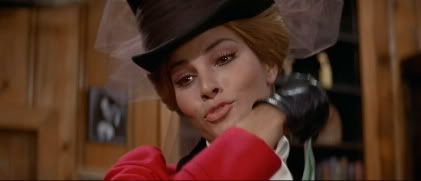
Britches people! Britches!
In his commentary Sarne complains that the film's second screenwriter, David Giler (who remains best known for producing the Alien series of films), inserted a lot of irrelevent political commentary into the script, which he had no choice but to film. Though my inclination is not to believe a single word Sarne says, the next scene goes a long way to giving credence to his alibi. In it Buck meets with his lawyer, Charlie Flager Sr. (character actor Robert Lieb), who rants about the pornographic movie he just watched for the third time. As the two oldtimers complain about the commie perverts who are taking control of the culture, a couple make out behind them and a hippy is beaten (very gingerly) by a group of cops outside. This is as hamhanded and obvious as political commentary can get, but before we can feel any sympathy for Sarne, he caps the scene with the second appearance of his "leitmotif" who asks if Flager wants any "nuts" on his banana split.
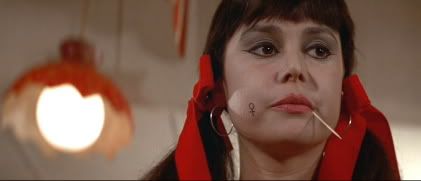
Asshole!
We then go on to a sequence where Myra mindfucks Rusty as she gives him a lesson in posture (one of her two specialties remember). She eventually gets him against a wall, where she proceeds to pull down his jeans with a gleeful "Gotcha!"
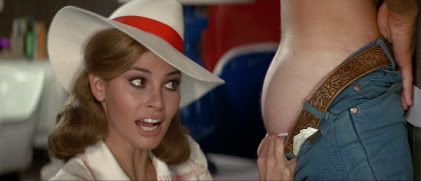
Why Sarne? Why?
We are spared the sight of Rusty's reaction to this humiliation, as the film instead cuts to a short party/orgy sequence that adds nothing to the plot (which comes as no surprise since it features Mae West's character) and only seems to exist to provide some nudity to justify the film's X rating. That done, the movie then gets back on track and returns to the school's saloon where Mary Anne tearfully tells Myra that Rusty has been arrested for violating his parole. It is at this point where Mae West's character actually comes closest to being relevent to the film, as she now appears in the saloon with Buck, who treats her with the respect her status deserves. As they sit down she complains that "...all the gay boys are going to take the business over. There's no more studs around anymore. Everyone's poppin' pills and smokin' grass." What this has to do with anything is anyone's guess, but she does deliver her lines with gusto, reminding us just how annoying a bad Mae West impersonater (which is really the best way to describe her performance) can be.
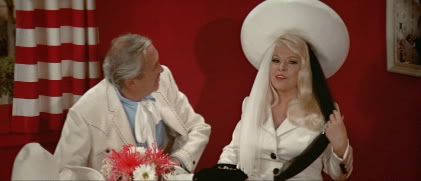 It was most likely this movie that propagated the rumor that West was really a drag queen
It was most likely this movie that propagated the rumor that West was really a drag queenwho kept a really big secret for 50 years. I don't think it's true, but she is more manly than Rex Reed.
Speaking of performances, it's probably a good time to mention that Welch's take on her transexual character largely involves her wearing a different outfit and hairstyle in every single scene she appears in. Each ensemble is more outrageous and fambloyant than the next, but if I were more open with my inner homo I would spend the next paragraph rhapsodizing about the frilly black number she wears in the only scene in which she is onscreen with her chief onset rival (the two actresses loathed each other; West hated Welch for her lack of respect and rudeness, while Welch resented the fact that West got top billing for a role that adding nothing to the film and was truly pissed off that the filmmakers acquiesced to all of the older star's bizarrely inappropriate demands). Instead I will merely say that I find it very attractive and it makes me wish I could have sex with her, which I think is the appropriate hetero response.
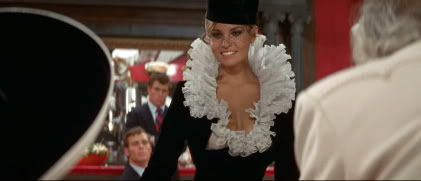
Isn't it just so utterly fabulous!
But then it might be a bit of a stretch to say that the two actresses appear together in this scene, since we never actually see both of their faces in the same shot. It's fairly obvious that the two divas hated each other so much that they refused to work together and the entire scene was shot using body doubles. This probably explains the look on John Huston's face:
Through their body doubles, Leticia and Myra are able to bond--imagining a time when they will have as many handsome young men to bed as they desire. Myra is also able to convince Leticia to help her extricate Rusty from his legal woes. In the scene that follows, Leticia calls a judge she knows intimately and gets Rusty released into Myra's care. This is literally the only moment when her character does anything relevent to the plot of the movie we are supposed to be watching. Somehow I think they could have figured out another way to get Rusty out of jail, but that's just me. After having to listen to another "politically satirical" rant from the judge, Myra reunites Rusty with Mary Anne and the three of them go out for a night on the town, where that evening's entertainment consists of--who else?--Leticia Van Allen. Among the demands that West made that irked the holy living bejesus out of Welch, the oddest had to be her insistence that she be giving not one, but two musical numbers in the film. Considering that a) the movie wasn't supposed to be a musical, b) West's character was supposed to be an agent, not a night club performer and c) she was too old to do anything a real musical number physically required, I think Welch had a good reason to be enraged that Sarne agreed to the older star's insane stipulation. That said, the musical numbers are entertaining in a Faces of Death kind of way.
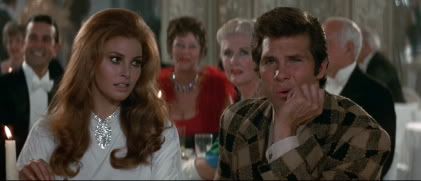
I think I've done a good job of establishing my belief that Raquel Welch was a smoking hottie.
As the old woman "sings" her song onstage, Rusty and Myra engage in a debate about homosexuality which goes like this:
Rusty: Hell, jail wouldn't be so bad if it wasn't for all those faggots. There's alway some fruit after you.
Myra: That shouldn't bother you Rusty.
Rusty: Well, the whole idea makes me wanna puke--a man should act like a man. Know what I mean?
Myra: How should a man act?
Rusty: (after a loooong pause) He should ball chicks. That's how.
At this point Sarne inserts another appearance from his "leitmotif".
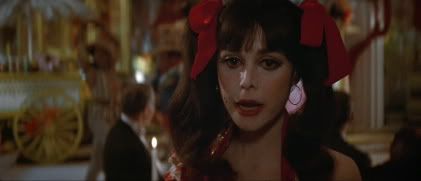
Assholesezwhat?
After pondering Rusty's last piece of wisdom, Myra waxes philosophic.
Myra: What is normal?
Mary Anne: Well, it's what everyone does. I mean, it's what the majority of society does most.
Rusty: (after a slightly shorter pause than before) Yeah!
Thus ends the great human sexuality debate of 1970, just in time for another musical number during which West does something truly attrocious to Otis Redding:
This cuts to several scenes that give us unneeded and unwanted insight into Buck's home life and fondness for massages. And here we finally come to the scene for which this WWTTM is best remembered. Sarne calls the scene the film's "sine qua non," but he's an asshole so ignore him at your leisure. That said it isn't unreasonable to declare the scene the film's raison d'etre, which is unfortunate because when it ends the movie still doesn't make any sense.On the pretext that Rusty needs his spine "traced" for a back brace he requires to tend to a recent injury, Myra calls him into the school's infirmary late at night and proceeds to weigh and measure him. She also makes him provide a urine specimen, which seems like questionable medicine to me, considering he's there about his back and she's not actually a nurse or doctor. Finally, after she has adminstered the "cough" test, she gets to the real reason she called him into the infirmary and orders him to drop trou so she can "take his temperature." He protests the need to have it taken "that way," but she threatens to go to the judge and have him sent back to jail if he doesn't comply. He gives in and--to keep him still--she ties him to the examining table.
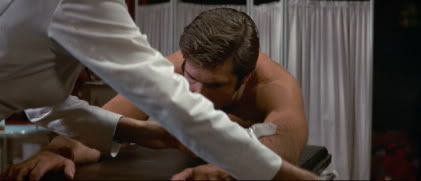
The stupidest man alive, ladies and gentlemen.
Thank you and good night. Having ensnarled him in her trap, she explains to him that he "...has a lot to learn. All you men have a lot to learn and I have taken it upon myself to teach you." "What are you going to do?" he asks her.
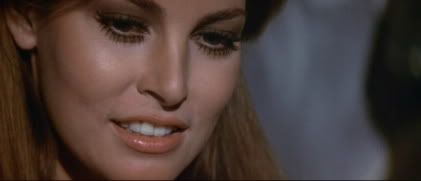
And cue dramatic thunderclap...now!
"I shall ball you Rusty," she answers him diabolically. "It's very simple." And then she sodomizes him as the movie cuts frantically to footage from classic films:
Insert lame Brokeback Mountain joke here.
The first part of her plan now complete, she lets Rusty go. If he is upset about her horrible desecration of his body, he does not show it (or at the very least Roger Heron lacks the ability to express that particular emotion).
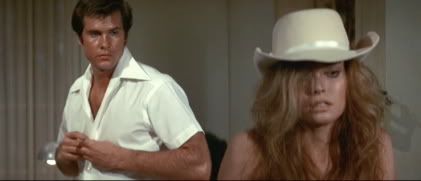
I don't quite get why she is the one who looks like she's just gotten some junk stuck in her trunk.
"Can I go now?" he asks her as he gets dressed.She nods and tells him he's free to leave, but before he goes she asks him one last question."Aren't you going to thank me for all of the trouble I've taken?""Thank you, ma'am," he answers her quietly, before he leaves.
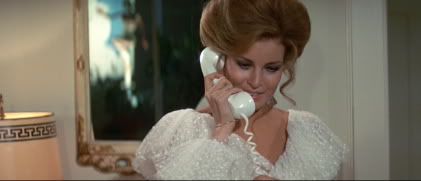
I have nothing funny to say in this caption.
Back at her apartment, Myra recieves a call from Mary Anne who is downstairs and wants to come up and see her. She happily invites her up and explains to Myron that "...having raped Rusty's manhood, I must now complete the cycle and seduce his girl. Only then will my victory be complete. Thus exuding power over both sexes and indeed over life itself." Before Myron can correctly accuse her of being a crazy bitch, Mary Anne arrives at the apartment. Then, under Myron's disapproving gaze (which Reed rather amusingly illustrates through the use of single cocked eyebrow), Myra attempts to seduce innocent young Mary Anne, who is distraught by Rusty's disappearance following his declaration that he "...was sick of women." Gee, I wonder why? (One has to assume that in Vidal's book Rusty's rejection of all things female was meant to suggest a reversal of his contention that the definition of manliness is the inclination to "ball chicks", but here it seems more like the understandable result of the resentment anyone would feel after having a woman rape them up the ass.)

Note the disapprovingly crooked eyebrow. Now that's acting!
Myra manages to convince Mary Anne to change into a pair of men's pajamas and stay in her bed that night. As she (and Myron) comfort the beautiful retard, she gets a call from Leticia, who thanks her for sending Rusty over to her place, where they have done things I refuse to think about. "Is it the right colour?" asks Myra, referring (I'm assuming) to Rusty's penis. "Well, I guess so," says Leticia. "It's the usual colour. Didn't you ever make it with him?" "Not in the classic way, no," answers Myra.
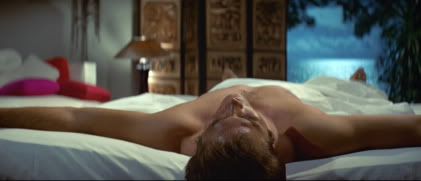 In his commentary Sarne tells us that Rusty's position in the bed is "obviously" based on Dali's Crucifixion.
In his commentary Sarne tells us that Rusty's position in the bed is "obviously" based on Dali's Crucifixion.It is his use of the word "obviously" that makes me conclude that he is an asshole.
Back at the drama school, Buck and his lawyer's son confront Myra with accusations that her Mexican wedding certificate is bogus and demand proof that she and Myron were really married. Myra calls their bluff and informs them confidently that "Proof will arrive before the end of the week in the person of Dr. Randolph Spencer Montag." This news stops the two men dead in their tracks. "M-montag?" stutters Flager, Jr. "The great dental psychiatrist?" Yes, that Dr. Randolph Spencer Montag, who just happens to be the Randolph mentioned in the note at the very beginning of the film.

Okay, would you trust your teeth to guy who looked like this?
Your mind, maybe, but your teeth? Never. Randolph is only too happy to help Myra out of her jam and agrees to fly over to California and confirm her and Myron's wedded status. In the end, though, it proves to be a wasted trip, since Myra is able to prove her connection to Myron with only a few words of encouragement from the good doctor (in fact the only reason the character appears in the film at all is to justify his being mentioned in the earlier note--I'm guessing he had a much more significant role in the book).Upon being told there is no record of Myron's death to be found anywhere, Myra finally tells her Uncle and his lawyers the truth--that she is in fact Myron. To prove her point, she gets up on Buck's desk, lifts up her skirt and drops her panties.
 I don't quite get what this would prove. Did the surgeon not give Myron a vagina?
I don't quite get what this would prove. Did the surgeon not give Myron a vagina?We know he doesn't have a penis, so is there just a Ken doll blank spot where his cooter should be?
"That's the ballgame," sighs Uncle Buck, knowing that he's been beaten.Her finances secure, Myra focuses her attention back on Mary Anne, who is willing to share a bed but won't "seal the deal" if you get what I mean (ie. have sex with her). She thanks Myra for all of her care and attention, but can't go through with a full-on descent into lesbomania. "If only you were a man," Mary Anne laments, unaware of the irony of her wishes.
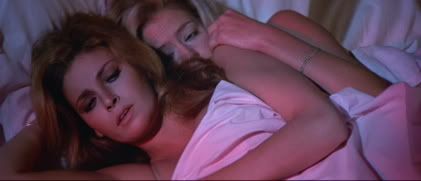
Now this here is some deviant sexuality I can get behind and give my full support!
We then cut to a shot of Myra attempting to cross a busy road, where she is almost hit by a car. Who is at the wheel? Why, it's Myron!
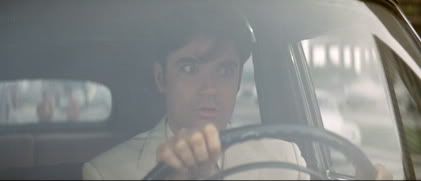
What could this possibly mean? Wait for it....
"I'll get you this time," we hear Myron think to himself. "It's a dangerous thing, ambition. It ruined Mickey Mouse's whole career. Well, now it's eight bars and out, honey. You were no more than a Linda Darnell paper doll; a Disney cow that got over the fence. You got ambitious. You were great in Cinemascope and Technicolor, but you can't cut it in black and white."Before we have time to figure out what the fuck that all means, Myron gets another chance to plow into Myra and this time he does not miss.
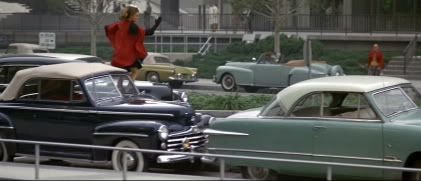
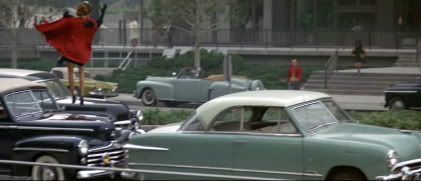
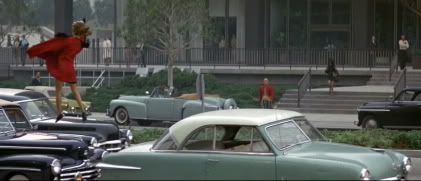
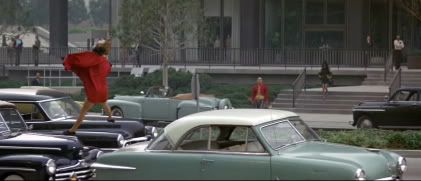
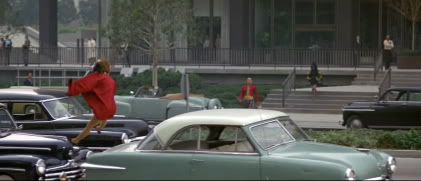
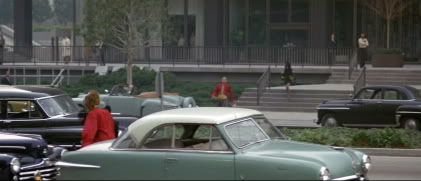
Oh, snap! Oh no, he dinnit!
But soon we learn that it wasn't Myra who was hit by a car, it was:
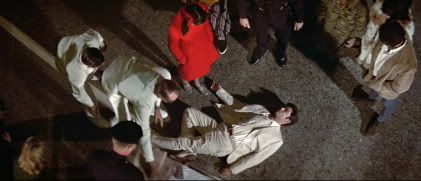
Confused? Don't worry, enlighenment is nigh upon us.
As he is taken away by the paramedics, Sarne gives us one last final look at his "leitmotif":
 Apparently her appearance in the film was inspired by a Fellini movie Sarne had seen.
Apparently her appearance in the film was inspired by a Fellini movie Sarne had seen.Assholes tend to steal ideas from more talented people.
The DVD of the film includes two different versions of the movie that are identical save for the very last scene. In the regular version of the film (which features an entertainingly honest commentary by Welch), this scene is in colour, but in the "Director's Cut" (which features a weaselly commentary by Sarne) it is in black and white, which--the director tells us--is meant to remind us of The Wizard of Oz.Like Dorothy, Myron wakes up in a bed, but instead of being surprised to discover his friends and family keeping watch over him, like she did, he grabs his chest and asks "Where are my tits? Where are my tits?":
Somehow I think we're still not in Kansas here.
Turns out Myron is in a hospital, where he is visited by a doctor who resembles the world's most famous lost millionaire.
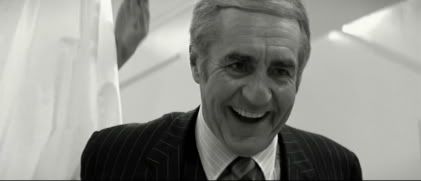 With this one small cameo, the film is saved by the "Jim Backus Rule",
With this one small cameo, the film is saved by the "Jim Backus Rule",which clearly states that you have to love any movie that features an appearance from Mr. Magoo.
The two men engage in a brief and completely nonsensical discussion about movies, as the brunette nurse who is giving Myron an injection transforms into:
Thanks to sloppy editing (the "transformation" could just as easily be confused for a continuity error, which it might have actually been)it is unclear if Mary Anne's appearance here is a fantasy or something that is really happening.
As Myron takes in this vision of loveliness, he realizes that his life as Myra was just a dream. The proof of this being the movie magazines on his night stand, which feature a famous actress on their cover:
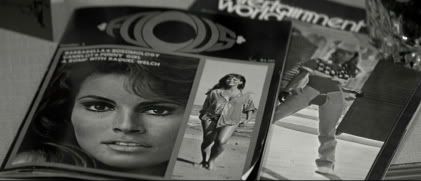
Thank God they didn't go with Mae West.
And that my friends is the end.
As the credits roll Sarne insists that it is perfectly clear that the film we have just seen is about a movie critic who got hit by a car and dreamed he was a woman and that the only way he could make this any clearer would be to remake the whole film again. I think you know by now what word I shouted at my TV set when he said this, but in case you don't, I'll give you a hint--it rhymes with "mass pole".
So that's Myra Breckinridge. Having read about it you would all do well to remember that it won't grow back if you cut it off--unless you do it in a dream.
 Monday, May 28, 2012 at 6:00AM
Monday, May 28, 2012 at 6:00AM 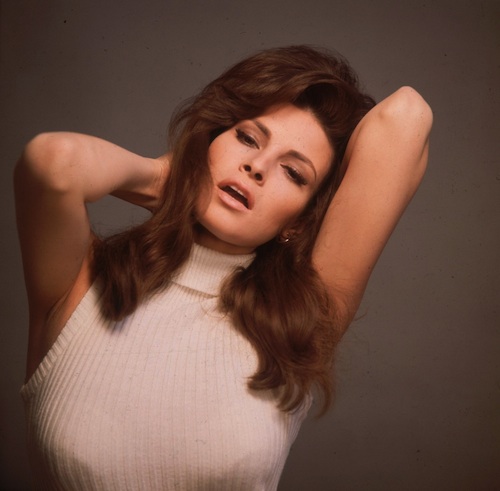
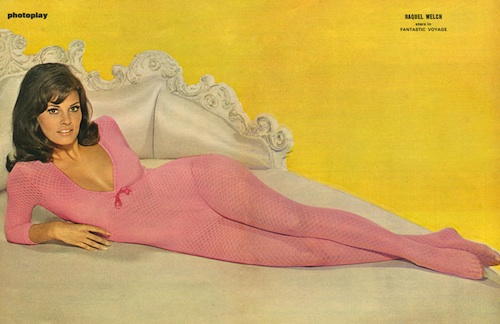
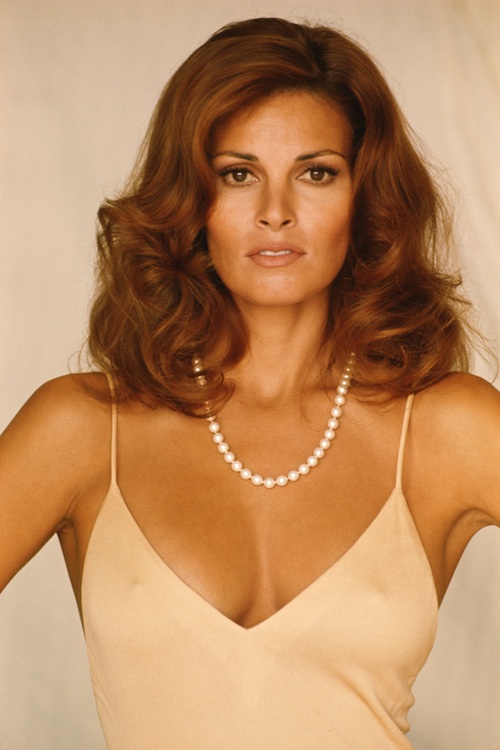
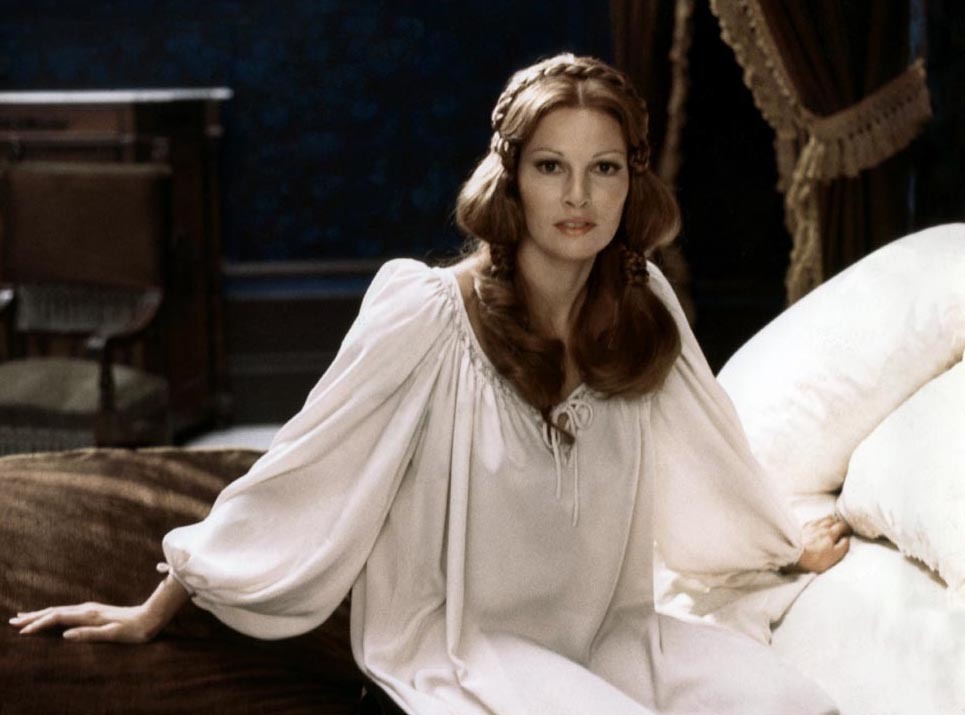

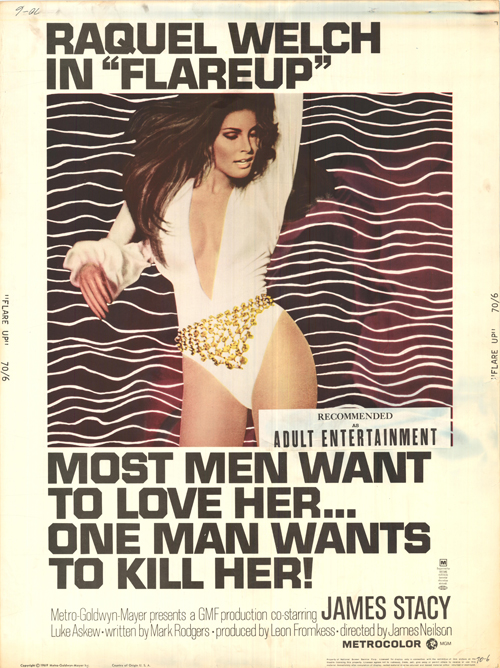
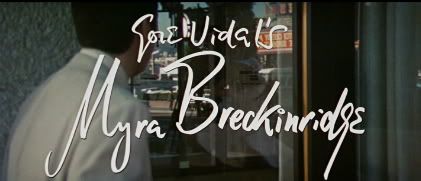

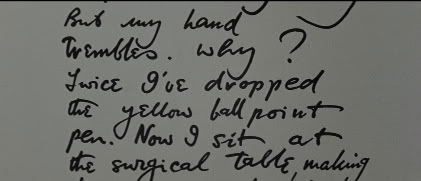

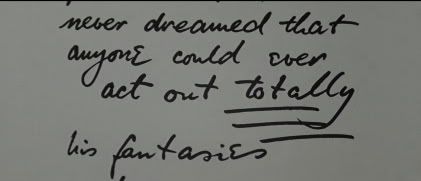

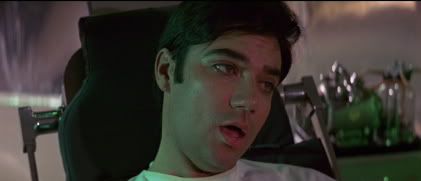
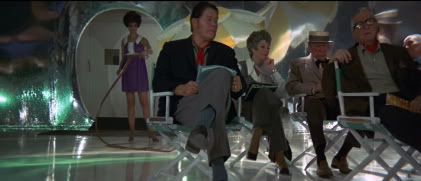


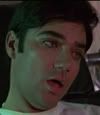 become
become  ?
? 